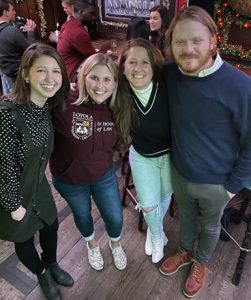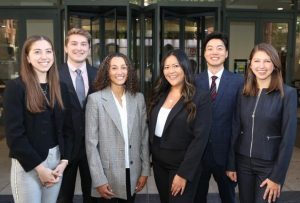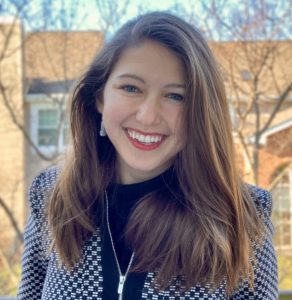I often hear this question: “But what are you going to do after law school?”
Right now, it’s an unsolved equation. But I’m working through the terms.
Patent Law = Engineering + Law
I’m exploring patent law because it represents the sum of two important interests in my life, engineering and law.
While studying mechanical engineering at the University of Notre Dame, I studied abroad and took “Intellectual Property for Engineers”. Just like engineering, patent law seemed to be about analysis and problem-solving. I learned that the requirements for a patent to be granted was just another equation. Applying the law to a patent validity case could feel as “technical” as engineering.
Patent = Patentable Subject Matter + New + Useful + Non-Obvious + Sufficient Disclosure
Even though mechanical engineering was a time-intensive degree, I invested a lot of time in Notre Dame’s mock trial program, simply because I loved it. Mock trial strengthened my ability to make strong and cohesive arguments in support of our fictional clients.
After graduation, I began working as an engineer in the aviation field. I loved engineering, especially aircraft certification work, which felt like an integration between legal compliance, design, and analysis.
During COVID when my workload was a lot lighter, I took on a three day-per-week position as Engineering Manager at a Chicago start-up called LuminAid. I respected the founders and their work creating an important product – a solar-powered lantern made for hikers, campers, those displaced, and those impacted by natural disasters. I learned that prior to me joining, a competitor had challenged the validity of LuminAid’s patent. The Patent Trial and Appeal Board of the U.S. Patent & Trademark Office ruled entirely in LuminAid’s favor. LuminAID’s counsel dubbed it “The Case of the Millennial Inventors” because they had documented their innovative design process so well. I was inspired by the founders and what they’d achieved. I saw the real-life application of successful patent protection, and its value.
I went back to my full-time career in aviation with a new appreciation for the importance of patent protection for inventors. As much as I enjoyed aviation, law school was still calling me! That’s when I learned about Loyola’s WeekendJD (WJD) program.
WJD = School + Fun + Room for Other Life Stuff
Loyola’s four-year WJD is a part-time JD program which allows students to take classes during the weekends (and sometimes evenings) so we can simultaneously continue our careers. Some of my peers are parents. Some of my peers commute into Chicago from far away. Some of my peers have become my best friends!
We’re a diverse cohort, but most of us share certain experiences in common: we balance multiple (sometimes competing) obligations. We’re in law school because we really want to be. We appreciate and root for each other as hard as we root for ourselves.
When we meet for in-person class weekends, we take full advantage of our time together. Our Saturdays start with oatmeal in the law school followed by a morning class. We all eat lunch together before heading to a different class for the afternoon. We end the day at Streeters or at dinner and karaoke or dancing in the city. Then, we start all over again on Sunday! I find even though our class weekends are intense – it’s the combination of intense learning and fun experiences with friends I care most about.

Loyola = Law for Today + Change for Tomorrow
We all know that many organizations make word-salad mission statements for PR purposes, with no intention of disturbing traditional power structures to enact positive change. Call me a convert, but I believe based on my experience so far that Loyola – on the whole – makes a good-faith effort to live up to its mission statement. Professors don’t simply teach students how to apply the law; they also help students to observe who the law fails to protect. Being a Loyola student means being encouraged to seek greater understanding and use this understanding to make the world better.
IP at Loyola = Learning + Accessibility + Networking + Application
After admittance but before acceptance, I applied for an IP Fellowship Scholarship. I interviewed with a wonderful Loyola IP professor, but I was honest about my doubts. “Do I even want to do IP?!” Professor Ho went above and beyond to support me. Not only did she answer all my questions, but she also invited me to the annual IP Alumni Event, which was virtual that year because of COVID. That event introduced me to current students in IP, including a WJD student named Michal Gawlik who provided mentorship. Professor Ho and Michal helped me see that exploring IP could help me to find my place at Loyola. In short, they encouraged me to lean into my curiosity and I am so glad I did. Even as a WJD student, I’ve been able to take IP classes such as Introduction to Intellectual Property Law and Patent Law with the terrific Professor Das.
There are many programs at the law school that are hard for WJD students to complete. That is NOT the case for Loyola’s IP program. From taking interesting IP classes to writing for IP Bytes to competing in the Saul Lefkowitz Moot Court competition (focused on trademark law), I’ve had so many opportunities to learn more about this area of the law.

One fun thing my moot court teammates and I noticed: unlike the other moot court teams whose problem statements were serious and sad, our problem statement was cheeky and fun. We prepared oral arguments about a fictional pop band’s use of a silly catchphrase which had been registered by a small record store owner. Our case was so much lighter and more enjoyable which made practices even more fun with our terrific and dedicated coaches.
Professor Ho invited me to a Richard Linn American Inn of Court event this past spring. I had the opportunity to watch a patent law oral argument and network with fellow students, judges, and attorneys. It was a blast meeting more people who care about this area of law – including experienced practitioners.
IP networking events typically happen in the evening, not during traditional working hours. IP Bytes encouraged WJD participation, solicited scheduling feedback for the kickoff meeting, and STILL recorded the session for those who missed it. These efforts might seem trivial, but they add up to a program that is actually accessible to WJD students, for which I’m very grateful.
IP = My Future?
We’ll see! I am grateful for the opportunity to explore IP as one of the possible paths I could take next, even though I’m still figuring out what’s right for me.
I like to believe that everything can be integrated – that every experience might meaningfully contribute to my future and help me make a positive impact. In short, I’m seeing where my experiences take me and watching the equation solve itself. If that doesn’t work out, I’m not too worried. I’m a problem-solver!

Rachel Wright
Associate Blogger
Loyola University Chicago School of Law, JD 2025
